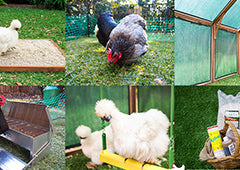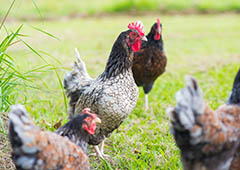We all know that chickens cluck and roosters crow, but did you know that chickens have their own language with over thirty different calls, each with their own specific meaning- that’s some serious chicken chat!
While it may seem like a bunch of squawking and cackling to us, these sounds are used to communicate some very important messages between a flock, such as ‘beware, there’s danger!’ or ‘look what I’ve found!’
While most of their communicating is done nonverbally, there are a few distinct calls chickens use for a particular purpose- some you may now recognise between your own flock! So let’s take a deeper look into the crazy world of chicken chat!
“Look at me, I’ve laid an egg!”
Probably the most distinctive chicken call, and one that you as a backyard chicken keeper should recognise, is that of the ‘egg song’. Hens are very proud creatures, and so revel in letting the rest of the flock know that they have in fact just produced a wondrous egg. This call is almost like a celebration of sorts, and other members of the flock may sometimes choose to join in- this can create quite the chicken chorus! Each chicken is individual in their ‘egg song’, and it can depend on the breed how vocal they choose to be.
“Help! I need to lay an egg-NOW”
As well as having a joyous call after having laid an egg, you may find that your girls will have a another call for when they need to lay an egg and they either can’t get in their coop, or the nesting boxes are all occupied. This call may sound slightly more stressed, because when your girl gotta lay, she gotta lay!
“Guys! Look! It’s Food!”
We all know that chickens love their food, so it’s hard for them not to squawk and squeal in delight well they come across a tasty treat to share. Chickens, being the sophisticated creatures they are, have developed a range of different calls for when they come across food. Each call will vary depending on the type of food on offer- if they have come across something exceptionally tasty, the calls will be produced at a much higher rate, compared to uncovering just their normal feed.
“Hey girl, look what I got for you”
If you’re lucky enough to have both roosters and chickens in your backyard flock, you may have noticed some distinct calls they share between one another. A rooster will often call his hens over to share an especially tasty treat he has found. Be it some cracked corn, or an extra juicy insect, the rooster will make an excited, low clucking sound to get the hens attention and alert them of his special find. The rooster will do this first and foremost to gain the trust of the hen in the hope to later breed with them, and to also ensure that his flock are receiving the proper nutrition they need- it’s the thought that counts, right?
“Look out, there’s danger about!”
A flock of chickens generally become very close knit and will do what they can to take care of one another and be sure that each chicken is safe and well. So being the clever creatures that they are, they have developed a warning call to alert other members of the flock if potential danger may be looming. Even more impressive is that they have different calls for the type of pending danger- the call for a snake coming along the ground will differ from the call that is made when an eagle in the sky has been sighted nearby. At this sound, the flock will immediately respond, either choosing to stand alert, take cover in their coop, or crouch down low, depending on the call made.
“Mumma!”
There is nothing more important or magical then the communication shared between a hen and her brood of chicks. This communication starts even before the chick has hatched, with peeping being heard from inside the shell. The mother will respond to this with low, soft coos and clucks to acknowledge them and show they are nearby. Mother and baby hens share a very distinct language filled with many different clucks and cheeps that are used to keep track of the brood, alert them to possible danger, and share their food finds with them.
“Ouch-that hurts!”
Hens will make a scream of distress, similar to the call made when a potential predator is lurking about, to signal their alarm when they have been hurt. For example, if you accidentally trod on their foot, if they’ve somehow managed to fall and hurt themselves, or if they are being bullied or pecked at, they will let out a loud squawk to make it known.
These are just some of the more common chicken calls that have been noted- these complex and communicative creatures have an entire language of their own. Not quite the bird brains we first thought!
From their squarks to their actions, we've all looked at our chickens and wondered what on earth are they doing? Some behaviours are cute quirks for a breed and others may be a cause for concern! Like all pets, chickens can be trained to stop bad behaviours and reinforce positive ones.
Cluckily, our friends over at Chickenpedia have created an amazing Chicken Etiquette Course. This extensive online course shares useful advice on a variety of chicken behaviours. The well-structured course will also help you deal with bad behaviour and encourage positive behaviours. Keep the neighbours happy - their only complaint will be that they wish they also had chickens!
Learn how to have the best-behaved chickens in town with this beginner-friendly course. This is why I highly recommend Chickenpedia’s courses to all of my readers! They are filled with vital information that help you raise a happy, healthy flock.
Click here to check out Chickenpedia today!

















